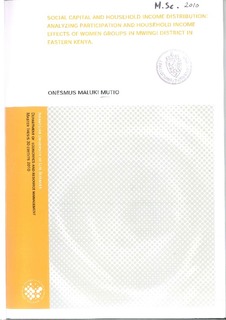Social capital and household income distribution: Analyzing participation and household income effects of women groups in Mwingi District in Eastern Kenya
Master thesis
Permanent lenke
http://hdl.handle.net/11250/187185Utgivelsesdato
2011-12-30Metadata
Vis full innførselSamlinger
- Master's theses (HH) [1072]
Sammendrag
This study investigates the impact of development aid channeled through local women groups in Mwingi district, Eastern Kenya. My main objective is to investigate whether the poorest households participate in these local women groups and to estimate the effect of participation on household income. The study uses household survey data collected from Mwingi district in June and July 2009. I used matching method based on kernel density estimation and the two step estimation on Heckman treatment effects model, treatreg. The results show that the poorest households do not participate in the local women groups and that participation in local women groups lead to a higher household income.
I therefore conclude that like other empirical studies have shown, social capital has
a positive effect to economic well being of the people. I also conclude that development aid channeled through local women groups do not benefit every household in the district but benefits only those households who have managed to acquire at least physical assets of 10,000 Kenyan Shillings. In my view this development aid is working to increase inequality in the society by widening the gap between the poorest and the poor. I suggest that the donors implement other policies that could also benefit the poorest households so that every household could partake of the blessings of this development aid.
